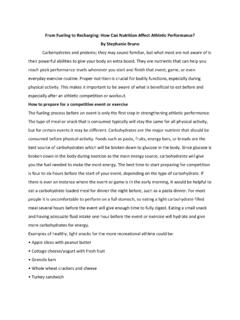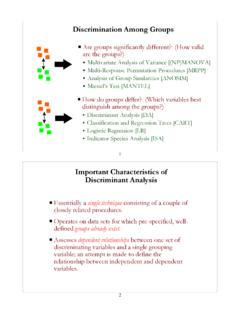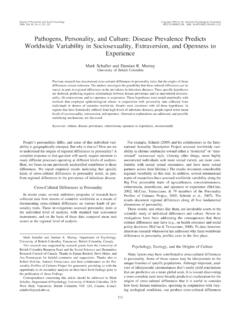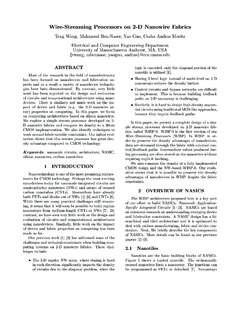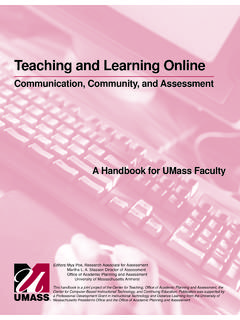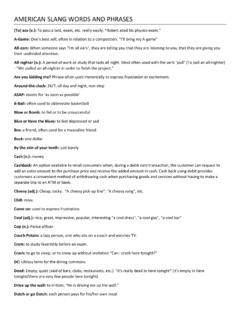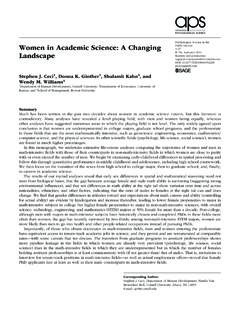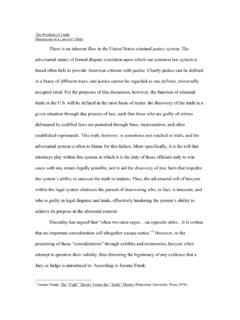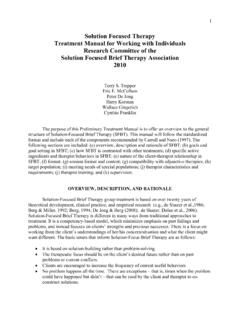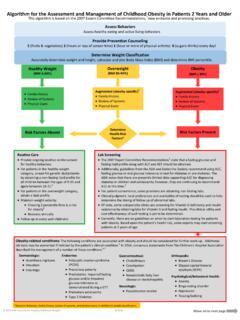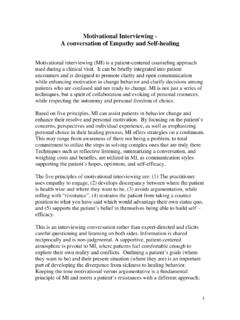Transcription of Motivational Interviewing Definition ... - UMass Amherst
1 A Definition of Motivational Interviewing The Definition of Motivational Interviewing (MI) has evolved and been refined since the original publications on its utility as an approach to behavior change. The initial description, by William R. Miller in 1983, developed from his experience in the treatment of problem drinkers. Through clinical experience and empirical research, the fundamental principles and methodologies of MI have been applied and tested in various settings and research findings have demonstrated its efficacy.
2 MI is now established as an evidence- based practice in the treatment of individuals with substance use disorders. Motivational Interviewing focuses on exploring and resolving ambivalence and centers on Motivational processes within the individual that facilitate change. The method differs from more coercive or externally- driven methods for motivating change as it does not impose change (that may be inconsistent with the person's own values, beliefs or wishes); but rather supports change in a manner congruent with the person's own values and concerns.
3 The most recent Definition of Motivational Interviewing (2009) is: .. a collaborative, person- centered form of guiding to elicit and strengthen motivation for change. The Motivational Interviewing Approach Motivational Interviewing is grounded in a respectful stance with a focus on building rapport in the initial stages of the counseling relationship. A central concept of MI is the identification, examination, and resolution of ambivalence about changing behavior. Ambivalence, feeling two ways about behavior change, is seen as a natural part of the change process.
4 The skillful MI practitioner is attuned to client ambivalence and readiness for change and thoughtfully utilizes techniques and strategies that are responsive to the client. Recent descriptions of Motivational Interviewing include three essential elements: 1. MI is a particular kind of conversation about change (counseling, therapy, consultation, method of communication) 2. MI is collaborative (person- centered, partnership, honors autonomy, not expert- recipient) 3. MI is evocative (seeks to call forth the person s own motivation and commitment) These core elements are included in three increasingly detailed levels of Definition : Lay person s Definition (What s it for?)
5 : Motivational Interviewing is a collaborative conversation to strengthen a person s own motivation for and commitment to change. A pragmatic practitioner s Definition (Why would I use it?): Motivational Interviewing is a person- centered counseling method for addressing the common problem of ambivalence about change. A technical therapeutic Definition (How does it work?): Motivational Interviewing is a collaborative, goal- oriented method of communication with particular attention to the language of change.
6 It is designed to strengthen an individual s motivation for and movement toward a specific goal by eliciting and exploring the person s own arguments for change. The Spirit of Motivational Interviewing MI is more than the use of a set of technical interventions. It is characterized by a particular spirit or clinical way of being which is the context or interpersonal relationship within which the techniques are employed. The spirit of MI is based on three key elements: collaboration between the therapist and the client; evoking or drawing out the client s ideas about change; and emphasizing the autonomy of the client.
7 Collaboration (vs. Confrontation) Collaboration is a partnership between the therapist and the client, grounded in the point of view and experiences of the client. This contrasts with some other approaches to substance use disorders treatment, which are based on the therapist assuming an expert role, at times confronting the client and imposing their perspective on the client s substance use behavior and the appropriate course of treatment and outcome. Collaboration builds rapport and facilitates trust in the helping relationship, which can be challenging in a more hierarchical relationship.
8 This does not mean that the therapist automatically agrees with the client about the nature of the problem or the changes that may be most appropriate. Although they may see things differently, the therapeutic process is focused on mutual understanding, not the therapist being right. Evocation (Drawing Out, Rather Than Imposing Ideas) The MI approach is one of the therapist s drawing out the individual's own thoughts and ideas, rather than imposing their opinions as motivation and commitment to change is most powerful and durable when it comes from the client.
9 No matter what reasons the therapist might offer to convince the client of the need to change their behavior or how much they might want the person to do so, lasting change is more likely to occur when the client discovers their own reasons and determination to change. The therapist's job is to & quot ;draw out& quot ; the person's own motivations and skills for change, not to tell them what to do or why they should do it. Autonomy (vs. Authority) Unlike some other treatment models that emphasize the clinician as an authority figure, Motivational Interviewing recognizes that the true power for change rests within the client.
10 Ultimately, it is up to the individual to follow through with making changes happen. This is empowering to the individual, but also gives them responsibility for their actions. Counselors reinforce that there is no single & quot ;right way& quot ; to change and that there are multiple ways that change can occur. In addition to deciding whether they will make a change, clients are encouraged to take the lead in developing a menu of options as to how to achieve the desired change. The Principles of Motivational Interviewing Building on and bringing to life the elements of the MI style , there are four distinct principles that guide the practice of MI.

